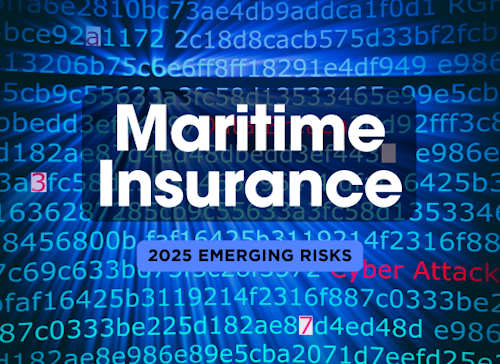Maritime Insurance in 2025: Navigating New Risks

Going into 2025, the maritime insurance landscape is evolving faster than ever, with new risks emerging that fleet owners and operators must navigate. From the growing threat of cyberattacks to the impacts of climate change and stricter environmental regulations, the risks facing maritime businesses are becoming more complex. Insurance policies are adjusting to cover these challenges, but shipowners need to stay informed to ensure they’re fully protected. Let’s dive into the key risks emerging in as we move into 2025 and what you should be looking for in your insurance coverage.
| ShipUniverse: Evolving Risk Landscape in Maritime Insurance (2024) | |
| New Risks | Impact on Insurance Coverage |
| Cybersecurity Threats | As ships and ports become more digital and interconnected, the threat of cyberattacks is skyrocketing. Insurers are now offering specialized cyber insurance policies, but coverage can be limited and expensive. Ensure you have protection against data breaches, ransomware, and operational disruption, especially for vessels equipped with advanced technology systems. |
| Stricter Environmental Regulations | New IMO regulations and regional mandates require ships to drastically reduce emissions, use cleaner fuels, and manage ballast water responsibly. Environmental liability insurance is a must for covering potential fines and remediation costs due to pollution incidents. Expect rising premiums as insurers factor in the risk of non-compliance. |
| Climate Change & Extreme Weather | Increased frequency of extreme weather events—hurricanes, cyclones, and rising sea levels—has led to a spike in claims. Insurance policies are adjusting by offering more comprehensive weather-related coverage, but shipowners should be aware that premiums for vessels operating in high-risk areas are climbing. Additionally, some insurers are imposing higher deductibles for weather-related claims. |
| Bio-Fouling Management Compliance | Failure to comply with bio-fouling management can lead to hefty fines and reduced fuel efficiency, increasing operational costs. Some insurers are now offering premium discounts for fleets that adopt bio-fouling management programs, as they see it as a proactive risk mitigation measure. |
| Autonomous and Semi-Autonomous Ships | With the rise of autonomous ships, insurers face a challenge in assessing risk. Policies covering human error may not apply to these vessels, and liability becomes more complex. Coverage for autonomous systems is still evolving, so shipowners should ensure they have adequate protection for technical failures and software malfunctions. |
| Supply Chain Disruptions | Global supply chain issues have increased the risk of cargo theft, delays, and damage. Cargo insurance is becoming more comprehensive, but shipowners need to ensure they’re covered for a wider range of scenarios, including delays due to port congestion or strikes. Pay close attention to the fine print on cargo coverage. |
| Geopolitical Tensions and Sanctions | Geopolitical instability, especially in regions like the Middle East and South China Sea, increases the risk of war, piracy, and disruptions to major shipping routes. War risk insurance is crucial, along with political risk coverage, which helps shipowners mitigate the impact of trade sanctions, regional conflicts, and piracy incidents. Insurers are now reviewing policies to reflect these growing risks in global hotspots. |
| Supply Chain Digitalization Risks | The growing reliance on digital infrastructure, including blockchain for shipping, introduces new vulnerabilities. Any cyber disruption to this digital supply chain can lead to significant delays, data breaches, or cargo loss. Shipowners must ensure their cyber insurance covers these digital infrastructure risks, which are becoming more common but may not be fully addressed in traditional policies. |
| Crew Health and Pandemic-Related Risks | The aftermath of the COVID-19 pandemic highlighted the importance of crew welfare. Insurers are now offering P&I policies that include pandemic-related coverages such as medical expenses, repatriation, and quarantine costs. It's crucial to check for these inclusions, especially as future health crises could lead to severe operational disruptions. |
| Green Technology Failures | As shipping companies adopt new green technologies like LNG, hydrogen, and battery-powered propulsion systems, there’s an increased risk of equipment failure due to the novelty and complexity of these technologies. Shipowners should make sure that their machinery insurance covers potential malfunctions, as well as accidents related to fuel systems that haven't been widely tested over time. |
| Increased Scrutiny on Ship Recycling | With the focus on sustainable practices, ship recycling comes with new environmental and financial risks. Non-compliance with international regulations could lead to hefty fines and reputational damage. Shipowners need coverage that addresses liabilities during the recycling process, especially as older vessels are decommissioned at a growing rate in 2024. |
| ShipUniverse: Recommended Insurance for Emerging Maritime Risks in 2024 | |||
| Emerging Risk | Recommended Insurance | Coverage Details | Premium Trend |
| Cybersecurity Threats | Cyber Insurance | Coverage for data breaches, ransomware attacks, and operational disruptions. Make sure policies cover digital systems on vessels and in ports. | ↑ Premiums rising due to increased cyberattacks on maritime systems. |
| Stricter Environmental Regulations | Environmental Liability Insurance | Covers fines and cleanup costs related to non-compliance with new IMO regulations on emissions and ballast water management. | ↑ Expect premiums to rise as more regulations come into effect and the risks of non-compliance grow. |
| Climate Change & Extreme Weather | Hull & Machinery Insurance / Weather-Related Coverage | Protects vessels from damage due to extreme weather events like hurricanes and cyclones. High-risk areas may see higher deductibles. | ↑ Higher premiums, especially for vessels operating in cyclone-prone regions. |
| Bio-Fouling Management Compliance | Marine Pollution Insurance / Premium Reduction Incentives | Policies covering potential fines for non-compliance. Insurers may offer discounts for fleets with certified bio-fouling management systems. | ↓ Premium reductions offered for fleets with proactive bio-fouling management. |
| Autonomous and Semi-Autonomous Ships | Specialized Autonomous Ship Insurance | Covers technical failures, software malfunctions, and liability for damages caused by autonomous operations. Policies still evolving in this area. | ↑ Higher premiums as insurers grapple with liability for non-human errors. |
| Supply Chain Disruptions | Cargo Insurance / Business Interruption Insurance | Covers loss, theft, or damage to cargo due to delays, theft, or port strikes. Business interruption insurance covers revenue loss from major disruptions. | → Stable, but port congestion risks may cause slight premium increases. |
| Geopolitical Tensions and Sanctions | War Risk Insurance / Political Risk Insurance | Covers losses related to conflicts, piracy, or government sanctions. Policies should be tailored to the regions where vessels operate. | ↑ Premiums increasing in geopolitical hotspots like the Middle East and South China Sea. |
| Supply Chain Digitalization Risks | Cyber Insurance / Business Interruption Insurance | Covers operational disruptions caused by digital failures, including blockchain breakdowns or cyberattacks on digital supply chain systems. | ↑ Rising premiums as digital infrastructures in shipping are increasingly targeted. |
| Crew Health and Pandemic-Related Risks | P&I (Protection & Indemnity) Insurance | Covers pandemic-related costs such as crew medical expenses, repatriation, and quarantine measures. Ensure policies cover future health crises. | → Stable, but insurers may introduce pandemic clauses in future renewals. |
| Green Technology Failures | Machinery Breakdown Insurance / Green Technology Add-ons | Covers technical failures related to green propulsion systems (LNG, hydrogen, etc.). Look for policies that include these newer technologies. | ↑ Higher premiums due to the complexity and novelty of green tech systems. |
| Increased Scrutiny on Ship Recycling | Environmental Liability Insurance | Covers liability for environmental damage or legal violations during ship dismantling and recycling operations. Important for owners scrapping older vessels. | → Stable, but likely to rise if regulations around sustainable recycling become stricter. |
Key Considerations for Shipowners
- Assess Your Operational Risks
Every fleet operates differently, and not all risks apply equally to every ship. Consider where your vessels operate, the routes you frequently sail, and the type of cargo you transport. If you regularly sail in geopolitical hotspots or experience extreme weather, more specialized insurance may be essential. - Evaluate the Cost of Potential Losses
Think about the worst-case scenario. What would it cost you if a major cyberattack shut down your fleet’s systems, or if your vessel suffered catastrophic damage in a storm? Compare the cost of a potential loss with the price of insurance premiums. Often, the cost of insuring against a high-risk event is significantly lower than the financial impact of the event itself. - Consider Coverage Gaps in Basic Policies
Basic policies, like Hull & Machinery or P&I insurance, may not cover emerging risks such as cyberattacks or climate-related damage. If your fleet is becoming more digital or operating in areas prone to extreme weather, consider policies that specifically cover these gaps. Insurers are increasingly offering modular policies to fill these gaps without overpaying for blanket coverage. - Factor in Premium Trends for 2024
Premiums for new types of insurance, like cyber and environmental liability, are on the rise. However, some insurers offer discounts for proactive risk management strategies (e.g., adopting bio-fouling management programs). If you're able to reduce risks through operational measures, you could offset the cost of additional insurance.
Insurance Types to Consider:
Cyber Insurance 💻
Worth it if: Your fleet relies heavily on digital systems for navigation, cargo management, or communication. The increasing number of cyberattacks on maritime systems makes this insurance almost essential for tech-integrated fleets.
Consider: How reliant are you on digital infrastructure? If an attack were to disrupt operations, would you be able to recover without financial ruin?
Environmental Liability Insurance 🌍
Worth it if: Your vessels operate in regions with strict environmental regulations or transport potentially hazardous cargo. Fines for non-compliance are rising, and cleanup costs can be astronomical.
Consider: Are you operating in areas like the EU or California, where environmental laws are tightening? If so, investing in this coverage could save you from crippling fines and lawsuits.
Climate Change & Weather-Related Coverage 🌪️
Worth it if: Your fleet operates in areas prone to extreme weather (e.g., hurricanes, cyclones). Damage from severe weather events is unpredictable, and weather-related insurance can offer peace of mind.
Consider: How often do you encounter rough weather, and do you have the reserves to handle vessel damage without insurance support?
War Risk Insurance / Political Risk Insurance 🛡️
Worth it if: Your routes take you through regions with high geopolitical tensions or piracy risks, such as the Middle East or South China Sea.
Consider: If you operate in relatively stable regions, this may not be necessary. But if your trade routes cross risky waters, skipping this coverage could be a dangerous gamble.
Pandemic-Related Insurance (P&I with pandemic clauses) 🦠
Worth it if: You transport international crews frequently and want to avoid pandemic-related disruptions, such as crew quarantines or repatriation costs.
Consider: Future pandemics could impact global travel and crew movements, so being prepared for the next health crisis may save you from unexpected costs.
Green Technology Insurance ⚡
Worth it if: You’ve invested in green propulsion systems like LNG, hydrogen fuel cells, or hybrid engines. These systems are relatively new, and their failure could lead to costly repairs.
Consider: How confident are you in the technology you've adopted? Insuring against green tech failures might be a smart move if you’re an early adopter.
Bio-Fouling Management Insurance (or Premium Reduction Incentive) 🦠💧
Worth it if: You want to save on fuel costs by keeping your hull clean and avoid hefty fines for non-compliance with bio-fouling regulations.
Consider: Are you implementing bio-fouling programs? If yes, you may be eligible for premium reductions, making this a cost-effective decision.
Supply Chain Disruption Insurance 🚢📦
Worth it if: You frequently deal with long supply chains and risks of port congestion, cargo theft, or damage. This insurance can also cover delays due to labor strikes or port infrastructure failures.
Consider: How often do you experience cargo delays or theft? If disruptions have significantly impacted your operations in the past, this policy might be a valuable addition.
Crew Health Insurance 👩⚕️👨⚕️
Worth it if: You operate with a large international crew, or if health-related issues (like mental health or physical injuries) can severely impact your vessel’s operations.
Consider: Are you prepared for sudden crew repatriations, medical emergencies, or extended sick leaves? Adequate crew health insurance can provide a financial safety net.
Autonomous Ship Insurance 🤖
Worth it if: You’ve invested in autonomous or semi-autonomous vessels that rely on AI and remote control. Coverage for human error might not apply, making this policy crucial.
Consider: Are your vessels fully or semi-autonomous? The more your operations rely on technology, the greater the need for specialized insurance to cover AI and system failures.
Geopolitical Risk & Sanctions Insurance 🗺️⚔️
Worth it if: Your vessels operate in regions where geopolitical tensions are high or sanctions could disrupt your operations. This policy helps cover losses due to conflicts, piracy, or trade restrictions.
Consider: Do you sail through conflict-prone regions or areas affected by sanctions? This coverage might protect you from losses you otherwise wouldn’t foresee.

Do you have a Maritime Product or Service that may be of interest to Shipowners? Tell us about it here!
Do you have feedback or insights? Please reach out to editor @ shipuniverse.com



